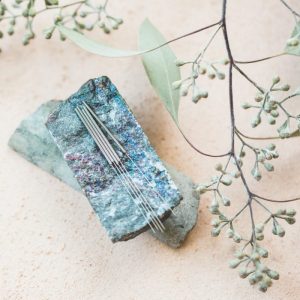What is Fertility Acupuncture?
Acupuncture for fertility is used to improve the function of your ovaries, increase circulation to the reproductive organs, and help ovulation. Acupuncture points are chosen based on the individual and the goal from a Chinese medicine standpoint, such as to improve Liver Qi Stagnation or enhance the Kidney Qi.
From a naturopathic and Traditional Chinese Medicine (TCM) perspective, fertility challenges are often viewed as disruptions in the body’s energy flow and organ system balance. By placing fine, sterile needles at specific acupuncture points, practitioners aim to restore this balance and promote a healthier reproductive environment. Acupuncture can help regulate menstrual cycles, support egg quality, and reduce stress—an often-overlooked factor that can interfere with conception. It may also support hormonal balance and improve the lining of the uterus, increasing the chances of successful implantation.
This gentle, holistic approach is often used in conjunction with other fertility treatments, including IUI and IVF, to enhance outcomes and reduce side effects. Whether you’re trying to conceive naturally or with medical assistance, acupuncture can be an effective part of your fertility journey, offering both physical and emotional support.
How Often Do I Have to Come for Fertility Acupuncture?
For this type of acupuncture, I initially recommend treatment once per week for 6 weeks. This builds our base or foundation. After that, I would reduce the frequency to once per month to maintain the beneficial effects.
What Does It Do? How Does it Work?
Current thinking regarding this type of acupuncture is that it increases β-endorphin production, which may, in turn, affect gonadotropin-releasing hormone (GnRH) secretion, which then improves ovulation and the menstrual cycle.
Can I Do Acupuncture for Fertility with IVF?
Yes, absolutely. In fact, I strongly encourage anyone who is undergoing IVF to include acupuncture as part of their treatment plan to improve their chances of success. Fertility acupuncture can enhance blood flow to the uterus and ovaries, which helps improve the quality of the uterine lining and supports the development of healthy eggs. It also helps regulate the hormones that are essential for ovulation and implantation—making your body more receptive to the IVF process.
Several studies have shown that women who receive acupuncture before and after embryo transfer have higher pregnancy rates compared to those who don’t. This is likely due to acupuncture’s ability to reduce uterine contractions, lower stress hormones like cortisol, and support endometrial receptivity at this critical time. It also promotes emotional well-being, which is incredibly important during the high-stress experience of fertility treatment.
In my clinical experience, fertility acupuncture complements IVF beautifully. I typically recommend starting weekly sessions at least one to two months before the IVF cycle begins. This gives your body time to respond and build the foundation for a successful outcome. Then, we do additional treatments leading up to the egg retrieval and again on the day before and the day of the embryo transfer.
Overall, acupuncture is safe, gentle, and evidence-informed. For many, it provides not only physical support but also a sense of calm and control throughout the IVF journey.
Does it Hurt?
Not really. Acupuncture needles are not much thicker than a strand of hair. With a quick tap, the needle goes in. You may feel a teeny pinch as it does, or you may feel nothing at all. If you do feel it at all, the sensation subsides very quickly. After that, you may be aware that the needle is there, but it is not painful. You may feel a pressure sensation.
How Long Does Each Session Take?
An acupuncture session lasts about 30-40 minutes. Once the needles are inserted, they remain in for about 20 minutes.
Are There Any Side Effects?
Patients may experience mild bruising at the needle insertion site, especially in areas with thinner skin or more delicate blood vessels. This bruising is usually small, painless, and resolves on its own within a few days. In rare cases, patients might feel light-headed or dizzy during or after a treatment – this is often related to low blood sugar or nervousness and can be prevented by having a small snack before the session. Some people report feeling very relaxed or drowsy afterward, a positive rather than a side effect of fertility acupuncture.
Importantly, when fertility acupuncture is performed by a properly trained and licensed professional using sterile, single-use needles, it is extremely safe and has no long-term or serious side effects. Fertility acupuncture does not disrupt the body’s natural processes or carry risks of hormonal overstimulation. Instead, it works gently with your body to promote balance and enhance reproductive function.
The Science Supporting Fertility Acupuncture
Fertility acupuncture is a science-backed approach to stimulate specific points on the body to improve reproductive health. Research shows that fertility acupuncture can influence the hypothalamic-pituitary-ovarian (HPO) axis – the hormonal system regulating the menstrual cycle, ovulation, and overall fertility.
By promoting blood flow to the ovaries and uterus, acupuncture helps create an ideal egg development and implantation environment. Studies also show that it can reduce stress hormone levels like cortisol, which can interfere with ovulation and hormone balance. One significant benefit of fertility acupuncture is its ability to support women undergoing assisted reproductive technologies (ART), such as IVF. Clinical trials have found that women who receive acupuncture on the day of embryo transfer have higher pregnancy rates compared to those who do not.
Fertility acupuncture may also regulate the menstrual cycle, reduce symptoms of polycystic ovarian syndrome (PCOS), and improve egg quality by enhancing oxygen and nutrient delivery to the ovaries. It also appears to affect neurotransmitter levels, including endorphins and serotonin, which may improve mood and reduce the emotional burden of infertility.
Overall, fertility acupuncture offers a gentle, drug-free way to support natural conception or increase the effectiveness of medical fertility treatments. When personalized and used consistently, it provides both physical and emotional support throughout the fertility journey.
The Benefits of Fertility Acupuncture with Me
I’ll bring all of my tools to the table. In addition to acupuncture, I can review your fertility clinic records and determine which tests haven’t been done, order tests for you if you like, and help you understand which of your results could be improved upon and how. With me, your treatment plan will include acupuncture, diet, lifestyle, vitamins, minerals, herbs, and other natural supplements to optimize your health and fertility.
Interested in acupuncture?
By Dr. Pamela Frank, BSc(Hons), Naturopath
Dr. Pamela has practiced as a naturopathic doctor in Toronto since 1999. She has received numerous “Best Naturopath in Toronto” awards. She is registered with the College of Naturopaths of Ontario.
Dr. Pamela Frank uses a natural treatment approach that may include acupuncture, herbal medicine, nutrition, diet, vitamins, supplements, and other natural remedies to restore balance and provide long-term resolution to almost any health problem.

